 |
|
| busts of Augustus, Livia and other family members found in Crete (Heraklion Museum) |
 |
|
| busts of Augustus, Livia and other family members found in Crete (Heraklion Museum) |
63 BCE: Gaius Octavius Thurinus was born to Atia, niece of Julius Caesar, who adopted the young man posthumously in his will after his assassination in 44 BCE (click here for a genealogy that is fairly easy to interpret). Known now as Octavian (Gaius Julius Caesar Octavianus), he engaged with Mark Antony in a long struggle for the ultimate power in the Roman world, finally vanquishing the forces of Antony and Cleopatra in the naval battle of Actium in 31 BCE.
38 BCE: Octavian divorced Scribonia (an older woman whom he had married because of her family ties to Sextus Pompey at a time when he needed Pompey's political support) on the very day, it is said, that she gave birth to his only child, a daughter (Julia). He “persuaded” Tiberius Claudius Nero to divorce his young wife, Livia, although she already had a son (Tiberius) and was pregnant with another son (Drusus) at the time. Octavian and Livia were married immediately after both divorces. Julia went to live with her father, while Livia's two sons lived with their father until his death in 33 BCE, after which time they were raised by their mother and Octavian.
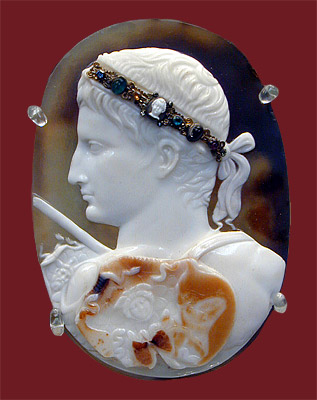 |
| cameo of Augustus with aegis |
27 BCE: The Senate awarded Octavian the official title of Augustus, and he assumed de facto control of Roman government while claiming that he had handed back all his power over the state to the Senate and Roman people (for his description of this event, see Res Gestae); this coin commemorates the “shield of valor” (clipeus virtutis) he was awarded on that occasion for “restoring the Republic.” He founded the Praetorian Guard, stationing some cohorts in towns throughout Italy and some in Rome itself, as a sort of urban police force. His aims were to establish a lasting peace after a century of civil wars, to build a political system which would secure stability for the empire, to restructure the government of the provinces in a way that would tie them more closely to Rome and enable them to share more fully in the Roman prosperity and order, to build up the Roman upper classes, and to restore the old Roman religion and morality. Hence much of his legislation dealt with moral and social reforms, especially those designed to strengthen marriage and encourage children among the upper classes and to discourage adultery, extravagance, and luxury of all kinds. Historians usually date the commencement of the Roman Empire from this year, though some term the system Augustus founded the Principate.
One of the major problems Augustus faced was how to ensure an orderly succession after his death to the new form of power he had created; in the absence of sons, he used the time-honored Roman strategies of adoption and controlling the marriages of the women in his family (especially his daughter, Julia). From his actions, it is clear that his aim was to secure a blood relative—preferably a direct descendant in the Julian line—as his successor, and it is one of the ironies of history that this strategy ultimately resulted in the emperor Gaius (Caligula), hardly the kind of ruler Augustus had envisioned. This diagram with accompanying slide show graphically illustrates the course of events in determining the succession, events which are dramatized (and fictionalized) in the novel I, Claudius.
23-12 BCE: Augustus's nephew, Marcellus, son of his sister Octavia and her first husband, was clearly the heir apparent. Augustus had married Marcellus to his daughter Julia two years earlier, but he died suddenly at the age of 19 during an outbreak of fever in Rome. In 21 BCE, Augustus married Julia to his old comrade and general Agrippa, to whom Augustus had entrusted his signet ring when he was seriously ill. The couple eventually had five children—three boys and two girls (see genealogy; click here for a bust of one of Augustus' grandsons); the youngest boy was born after the death of his father in 12 BCE (hence his name, Agrippa Postumus). In 17 BCE, Augustus adopted his two older grandsons, Gaius Caesar and Lucius Caesar. After the death of Agrippa in 12 BCE, Augustus married Julia to Livia's son Tiberius, who divorced a wife to whom he was devoted, Vipsania, to marry a woman whom he apparently disliked greatly.
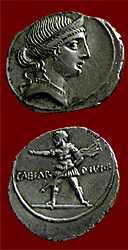 |
9-6 BCE: Despite coins such as this one which portrayed him as a heroic general (the goddess also depicted on the coin is Venus, from whom the Julian family claimed to descend), Augustus did not have any personal military skill, and he had to rely on members of his extended family to conduct military campaigns, especially his step-sons Tiberius and Drusus. Livia's sons carried out these commissions admirably, but unfortunately in 9 BCE her younger son, Drusus, died in Germany of wounds sustained when he was serving as general there. In 6 BCE, Tiberius refused Augustus's command that he be sent as a general to the eastern provinces; instead he retired to the Greek island of Rhodes. His stated reasons for this retirement were that he had served in many campaigns and needed a period of rest and that he desired to avoid any appearance of friction with Gaius and Lucius. Speculation added other reasons—that he could no longer endure the scandalous affairs of his wife, Julia, who was engaging in openly adulterous behavior; that he deeply resented Augustus's obvious preference for Gaius and Lucius, even though they were still teenagers; and that he hoped to prove that his services were indispensable to Augustus. This coin demonstrates the way that Augustus publicly promoted his grandsons as consuls designate, as “princes of youth” (principes iuventutis), and as heirs to his prestige and authority.
2 BCE: Augustus permanently exiled his daughter, Julia, to a barren island because of her adultery, which undercut his attempts at moral reform. He later exiled his granddaughter Julia for the same reason. The late Roman author Macrobius in his Saturnalia relates a number of stories and jokes supposedly illustrating the witty way that Julia dealt with her reputation for promiscuity, though since these were written some 400 years later, we cannot assume that they were the exact stories that circulated during her lifetime.
2 CE: Although Tiberius had been seeking permission to return to Rome from Rhodes for some time, Augustus withheld permission until now, only allowing his to return on the condition that he withdraw completely from public life. In the same year, however, Lucius Caesar died at the age of 19 from an accident when he was on his way to take up a command in Spain.
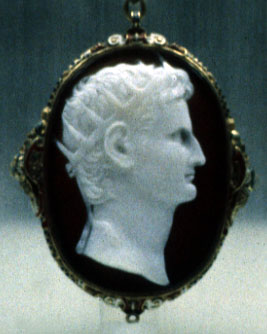 |
4 CE: Gaius Caesar, serving as governor in the East although he was only 24, was wounded while putting down a revolt and died on his way back to Rome. Augustus formally adopted Tiberius (now 46 years old) and his youngest grandson, Agrippa Postumus (now 15 years old). At the same time he compelled Tiberius to adopt his brother's son Germanicus (now 19 years old), even though Tiberius himself already had a son, Drusus, by his first wife, Vipsania. Because Germanicus was married to Augustus's granddaughter Agrippina, his sons would be blood relatives of Augustus and preserve the direct line. See the basic family tree or this more complicated genealogy for clarification of all the family relationships. 7-14 CE: Augustus disinherited and exiled Agrippa Postumus to the island of Planasia for reasons which are not known with any certainty. There were rumors that he secretly visited the island at the end of 13 CE with a view toward a possible reconciliation, though modern historians tend to discount this story. In any case, he fell seriously ill soon after and died on August 19, 14 CE, at the age of 76. In his will he adopted Livia into his lineage, so that her official name became Julia Augusta; click here for more information on this remarkable woman who became the prototype for future empresses. Agrippa Postumus was executed soon after Augustus's death, purportedly on instructions set down in the will of Augustus. Less than a month after his death, Augustus was deified (henceforth referred to as divus Augustus, as shown on a coin of Tiberius); the cameo at left depicts him wearing a crown with rays designating the sun god. Click here for a modern historian's summation of Augustus' career. |
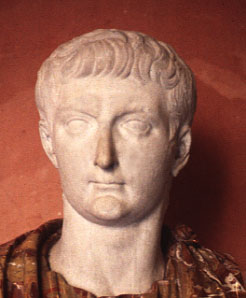 |
TIBERIUS AS EMPEROR |
14 CE: With the help of Livia, Tiberius easily took over the reins of power at the age of 55. The coins issued by Tiberius subtly indicate the role his mother played in legitimating his authority: for example, this coin depicts Tiberius on one side and a seated female who may represent Livia as a personification of the goddess Pax (Peace), and another coin uses the iconography of Livia to depict the allegorical “Salus Augusta.” The historian Tacitus, writing over 100 years later, describes the death of Augustus and the accession of Tiberius with a very negative spin on the role of Livia. Tiberius cut off the allowance of his wife Julia, still exiled on the island of Rhegium, so that she died of malnutrition before the end of the year.
19 CE: Germanicus, adopted son of Tiberius, died while serving as general with supreme command of the provinces of the East; his widow, Agrippina, charged that he had been poisoned by Gnaeus Piso, governor of Syria, and his wife, Plancina, an old friend of Livia. During the investigation, Piso committed suicide, but the trial went forward and Piso's name and reputation were compromised. An inscription detailing the results of this trial was discovered in the 1990s; this decree testifies to the degree of influence wielded by Livia, since the the penalty against Plancina was waived by the Senate explicitly because of the intercession of Livia, due to her “meritorious service to the state” (optume de r[e] p[ublica] merita, a formula most frequently used for male office-holders). In 23 CE, Tiberius's own son, Drusus (called Castor in I, Claudius) died suddenly.
26 CE: Tiberius moved from Rome to the island of Capri; he was never to return to the city of Rome before his death. Although an extremely efficient emperor, especially in the provinces, Tiberius was never popular either with the senators or with the populace. He had a grim personality and difficulty in expressing himself clearly; he was highly suspicious of the motives of others, even paranoid in his later years. His move to Capri may have stemmed from these reasons, especially his increasing fear of assassination. He frequently invoked a law against treason, interpreting any insults to the emperor as tantamount to treason against the state. Under this law people who informed against an individual suspected of treason received a portion of the accused's estate when he had been convicted and executed; hence there were always plenty of informers ready to spy on their neighbors. Since Tiberius governed in absentia, he relied on Lucius Aelius Sejanus, prefect of the Praetorian Guard, to manage things in Rome. Sejanus controlled all channels of communication with Tiberius.
29 CE: Livia died at the age of 86. Only a few of the direct descendants of Augustus were still alive at this time, primarily the children of his granddaughter Agrippina the Elder and Germanicus. His other granddaughter, Julia, had been banished for adultery and had died in exile in 28 CE; Augustus had executed her husband, L. Aemilius Paullus, for conspiracy and their daughter, Aemilia Lepida, was out of favor. But Agrippina and Germanicus had three sons (Nero, Drusus, Gaius) and three daughters (Agrippina the Younger, Julia Livilla, Drusilla); see genealogy for details. After the death of Livia, however, Tiberius, with the encouragement of Sejanus, systematically persecuted this family. Accusing them of plotting to assassinate him, Tiberius banished Agrippina the Elder and her oldest son, Nero; her second son, Drusus, was imprisoned a year later along with Asinius Gallus, who had earlier asked to marry Agrippina. Within four years these prisoners were all dead, mostly through starvation.
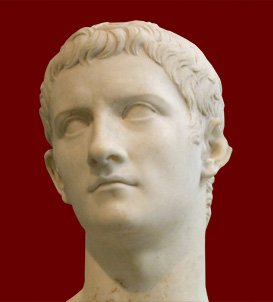 |
31 CE: Sejanus's power had increased dramatically with the imprisonment of all the surviving male direct descendants of Augustus except the youngest son of Agrippina, Gaius, nicknamed Caligula, “Little Boots.” Sejanus requested marriage with Livilla, widow of Tiberius's son and mother of his grandson, Tiberius Gemellus (Gemellus originally had a twin brother, Germanicus Gemellus, but he died as a toddler; Tiberius had celebrated the birth of this twin grandsons in this sestertius of 22 CE) . However, Tiberius turned against Sejanus, possibly because of a secret letter from his sister-in-law Antonia or from Sejanus's wife Apicata; he may have received evidence that Sejanus and Livilla had earlier poisoned his own son, Drusus, or that they were conspiring against him or against Caligula. In any case, Tiberius had Sejanus executed and appointed Macro prefect of the Praetorian Guard.
37 CE: Tiberius fell ill and eventually died at the age of 78; there were rumors that Macro and Caligula hastened the process by smothering him with a pillow. In his will he named Caligula (now 25-26) and his grandson, Gemellus (now a teenager), joint heirs. Caligula, a great-grandson of Augustus who had the support of Macro, the senators, and the populace, was proclaimed emperor amid general rejoicing.
Barbara F. McManus, The
College of New Rochelle
bmcmanus@cnr.edu
revised October,
2006